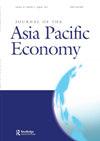FDI inflows and the economic growth of city clusters: evidence from China's Yangtze River Economic Belt
IF 1.5
4区 经济学
Q3 ECONOMICS
引用次数: 0
Abstract
Abstract This study investigates the impact and transmission mechanism of foreign direct investment (FDI) inflows on the economic growth of city clusters. Via theoretical analysis, a spatial Durbin model (SDM) and mediating effect model are applied based on panel data of the three major city clusters in the Yangtze River Economic Belt (YREB) from 1997 to 2018. The results reveal the following: (1) FDI inflows promote the economic growth of city clusters in the YREB, but the degrees of impacts on the three city clusters are different; (2) the spatial effects of FDI inflows differ across city clusters; the effects are negative in city clusters of the Yangtze River Delta and the Yangtze River Middle Reaches, and positive in the Chengdu-Chongqing city cluster; (3) urbanization and industrial structure upgrading are two important mechanisms by which FDI inflows promote the economic growth of city clusters. However, there are differences among the three major city clusters; the intermediary effect of urbanization is more significant in city clusters of Chengdu-Chongqing and the Yangtze River Middle Reaches, while the intermediary effect of industrial structure upgrading is more significant in the Yangtze River Delta and Chengdu-Chongqing city clusters. Policy implications are proposed accordingly.FDI流入与城市群经济增长——来自中国长江经济带的证据
本文研究了外商直接投资流入对城市群经济增长的影响及其传导机制。基于1997~2018年长江经济带三大城市群的面板数据,运用空间德宾模型和中介效应模型进行理论分析。研究结果表明:(1)FDI流入促进了长三角城市群的经济增长,但对三个城市群的影响程度不同;(2) FDI流入的空间效应在不同的城市群中有所不同;长江三角洲和长江中游城市群的影响为负,成渝城市群为正;(3) 城市化和产业结构升级是FDI流入促进城市群经济增长的两个重要机制。然而,三大城市群之间存在差异;成渝和长江中游城市群的城镇化中介效应更为显著,而长三角和成渝城市群的产业结构升级中介效应更显著。据此提出了政策影响。
本文章由计算机程序翻译,如有差异,请以英文原文为准。
求助全文
约1分钟内获得全文
求助全文
来源期刊

Journal of the Asia Pacific Economy
ECONOMICS-
CiteScore
3.70
自引率
7.10%
发文量
58
期刊介绍:
Journal of the Asia Pacific Economy (JAPE) is concerned primarily with the developing economies within Pacific Asia and South Asia. It aims to promote greater understanding of the complex factors that have influenced and continue to shape the transformation of the diverse economies in this region. Studies on developed countries will be considered only if they have implications for the developing countries in the region. The journal''s editorial policy is to maintain a sound balance between theoretical and empirical studies. JAPE publishes research papers in economics but also welcomes papers that deal with economic issues using a multi-disciplinary approach. Submissions may range from overviews spanning the region or parts of it, to papers with a detailed focus on particular issues facing individual countries. JAPE has a broad readership, which makes papers concerned with narrow and detailed technical matters inappropriate for inclusion. In addition, papers should not be simply one more application of a formal model or statistical technique used elsewhere. Authors should note that discussion of results must make sense intuitively, and relate to the institutional and historical context of the geographic area analyzed. We particularly ask authors to spell out the practical policy implications of their findings for governments and business. In addition to articles, JAPE publishes short notes, comments and book reviews. From time to time, it also publishes special issues on matters of great importance to economies in the Asia Pacific area.
 求助内容:
求助内容: 应助结果提醒方式:
应助结果提醒方式:


